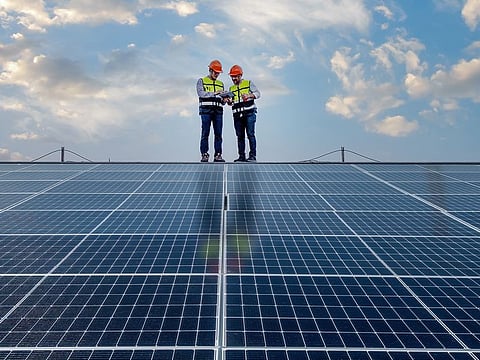Dipping cost of deploying solar energy will light up UAE sustainability drive
As one energy asset UAE has in abundance, solar will be core of net zero plans

The UAE has emerged as a major player in the ever-evolving landscape of sustainable energy solutions, particularly in solar energy. Known for its abundance of sunshine through the year, the UAE is positioned to generate and utilize renewable and sustainable energy, with the country’s ambitious zero greenhouse gas emission strategies set to become a reality.
What sets solar energy apart is its cost-effectiveness. The cost of manufacturing solar panels has plummeted dramatically in the past decade, making them not only affordable but often the cheapest form of electricity. Photovoltaic (PV) solar energy plays a significant role in this, offering consistent cost reductions, as highlighted by the International Renewable Energy Agency (IRENA)).
The UAE’s relentless pursuit of clean energy and its notable efforts to lead the way as a sustainable nation are commendable. The Shams Solar Power Station and the Mohammed bin Rashid Al Maktoum Solar Park in Dubai are excellent examples, with production capacity set to reach 5,000 megawatts (MW) by 2030.
The construction of the Al Dhafra Solar PV Facility in Abu Dhabi, poised to be the world’s largest independent solar power plant, with a capacity of up to 2 gigawatts (GW), is a testament to the UAE’s contribution to diversifying renewable energy sources, increasing energy production capacity, and reducing carbon emissions.
Why solar?
Over 90 per cent of the country’s land has the capability to produce solar energy. The country’s dedication to implementing clean energy solutions extends beyond electricity generation, as is proven by Abu Dhabi’s innovative Masdar City.
A sustainable urban community, Masdar City has embraced an advanced water production solution known as Atmospheric Water Generation (AWG) system, which captures moisture from the air and turns it into drinking water. The technology is inherently sustainable in that extracting water from the air does not produce any carbon emissions or require extensive resources.
What elevates its sustainability further is its integration with solar energy, exemplifying the immense potential of holistic environmentally friendly clean energy solutions.
Importance of digitalisation in the energy sector
As we navigate this transformative landscape of renewable energy, it's essential to recognize the critical role of technology and innovation. Al Masaood plays a crucial role in this thriving ecosystem through the development of products like SHAMS+, which is a home-grown, solar-powered technology that facilitates sustainable battery charging for EVs and marine vessels. It represents the beginning of an era of innovation led by organisations committed to advancing the path of industrial decarbonisation and energy diversification.
In today’s world, the digital transformation of the energy sector has become an integral driver in reshaping the way we produce, distribute, and consume energy. This shift toward digitalisation and AI is no longer a trend, but a necessity.
In an era where we are amassing vast amounts of data, the complexity of analysing, contextualising, and utilising it increases manifold, making it imperative for us to embrace tools like AI to optimize the efficiency of our solar energy projects and meet the evolving demands of society.
The impact of digitalisation is already evident through the phenomenal rise in the adoption of and investment in digital technologies in the energy sector. According to the International Energy Agency, investments in digital technologies related to the grid have surged by more than 50 per cent since 2015, and expected to constitute 19 per cent of total grid investments in 2023.
Notably, the distribution segment has emerged as a significant focus, representing over 75 per cent of total digital spend. Additionally, investments in EV charging infrastructure doubled in 2022. This digital revolution is our ally in shaping a sustainable future.
The boundless possibilities of renewable energy, particularly solar, beckon us as a catalyst for transformative change. Our pursuit of progress is a reflection of our dedication to a future where sustainability and technological advancement go hand in hand, reshaping the way we think and act.
As we stand on the cusp of a new era, the COP28 gathering of climate leaders presents a unique opportunity to further amplify our commitment to clean energy on a global stage.
Yet, I would argue that it’s not just about sustainable energy production; it’s about holistic sustainability, bolstered by the power of technology, innovation, and digitalisation. This is just the beginning of our pledge to a cleaner environment…








